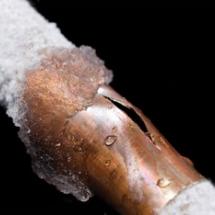BWSC is committed to providing you with safe and secure service. This section contains important safety measures and tips you can take to protect your business.
Prevent Frozen Pipes

When the temperature is extremely cold, water pipes in your business may freeze.
To help prevent frozen pipes, take the following precautions:
- Check for open windows, air vents, and wind drafts near water pipes
- Seal leaks in the basement foundation where cold air may enter. Stuff holes with insulation. A tiny opening may cause an exposed pipe to freeze
- Allow a slow trickle of water to flow through faucets connected to water pipes that run through unheated spaces
- Keep sink cabinet doors open during cold spells to allow warm air to circulate around the pipes
- Insulate pipes in unheated spaces like garages, basements, and crawl spaces
- It is important to locate the water shut off valve and know how to shut off the water
If a pipe bursts, shutting off the water promptly can help minimize the damage.
If your pipes freeze, use a hair dryer to thaw the lines safely. Thawing will not be fast, but it will be safe. NEVER USE AN OPEN FLAME TO THAW PIPES.
When pipes are frozen, there is often water available in at least one faucet. If there is no water coming through any of your taps, there may be a problem in your street or yard. Call BWSC’s 24-hour Emergency line at 617-989-7000.
Prevent Water Intrusion
The following guidelines have been developed to help protect your business from water damage:
- Elevate heating and hot water systems using a masonry base at least 12 inches above flood level
- Electrical panels and utilities also should be relocated to an area above the flood panel
- If space is not high enough to allow elevation of the utility, try to move it to an upper floor or attic space
- Build a floodwall around basement windows to protect the basement from low-level flooding
- Anchor fuel tanks to prevent them from floating or overturning
- If there is a catch basin in front of your home, try to keep leaves and debris off of the top of it to help prevent street and overland flooding during heavy rainstorms
- Install a floating floor drain plug at the lowest part of the basement or the lowest finished floor to reduce backups; when the floor drainpipe backs up, the float rises and plugs the drain
- Install backwater valves on all plumbing fixtures located below street grade; the Backwater Valve Pamphlet explains why these are needed and how to have them installed
If your basement or home is flooded, remember that electricity will go to ground through any good conductor: metal, liquid or you. Stay out of its path. NEVER touch appliances or wires when hands or feet are wet.
Cleanup Procedures After a Sewer Backup
After the cause of the sanitary sewer overflow (SSO) or sewer backup is resolved, the most important cleanup steps are to restore the environment to a dry state and salvage any valuable property. The longer sewage remains in your business, the greater the potential for damage to your property, and for health problems to develop to occupants.
Cleanup Procedures and Health Tips
